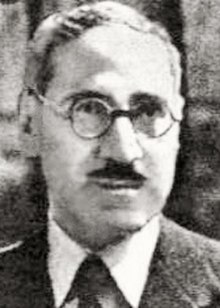Rashid Ali al-Gailani
Rashid Ali al-Gailani , also Rashid Ali al-Kaylani or Rashid al-Kilani ( Arabic رشيد عالي الكيلاني, DMG Rašīd ʿĀlī al-Kailānī ; * 1892 in Baghdad ; † August 28, 1965 in Beirut ), was Prime Minister of the Kingdom of Iraq .
origin
Gailani came from an old, respected family in Baghdad. In the 12th century his ancestor Abd al-Qadir al-Jilani was the founder of the Sufi order of the Qādirīya , which spread throughout the world of Islam .
Political career
He studied law in Constantinople . After the First World War he started working as a lawyer in Baghdad. A relative, Abd al-Rahman al-Haydari al-Gillani , became the first prime minister in Iraq. Yasin al-Hashimi , who headed the first government in Iraq, appointed him Minister of Justice in 1924.
With Hashimi he formed an opposition in the government to any British influence in Iraq. He rejected the Anglo-Iraqi Treaty in 1930 , which was signed by the Nuri as-Said government. The 1930 treaty obliged Iraq to essentially follow Britain's foreign policy and to provide assistance to Great Britain. He also granted Great Britain a military presence in the form of military bases at Basra and Al Habbaniyah, which kept Iraq still dependent on Great Britain. To represent the national interests of Iraq, al-Gailani founded the National Brotherhood Party with others .
Political offices

A first Prime Minister of Rashid Ali el-Gailani began on March 20, 1933 and ended with his resignation on October 28, 1933. His next state office he took over in the spring of 1935, when he was Minister of the Interior under Yasin al-Hashimi . After the unrest in 1938 he was banished from Baghdad.
In April 1940 he was again Prime Minister. The government broke up due to disagreement over the breakdown of diplomatic relations with Italy , which had entered World War II on June 10, 1940 on the German side . Gailani was against breaking these relationships. On January 31, 1941, el-Gailani resigned.
El-Gailani became prime minister again on April 2, 1941 after a military coup . In this role he tried to prevent the establishment of British associations in Basra. Gailani asked National Socialist Germany for support, which then came through the deployment of a squadron of the so-called special staff F ; German-Iraqi cooperation failed primarily because of poor coordination. On April 30, 1941, he had the British base Habbanija surrounded. German planes flew attacks on the British base.
From April 19, the way to Baghdad was clear for the British units. When the defeat of el-Gailani and his allies was clear, el-Gailani fled to Tehran , from there after some time via Turkey to Italy, where he spent the rest of the Second World War in exile, and tried to visit the Sachsenhausen concentration camp and also arranged a meeting with Hitler. He was also involved in pro-German and anti-Semitic propaganda.
When his defeat became apparent, it came on 1-2. June 1941 in Baghdad to a pogrom against Jews with almost 200 deaths and enormous destruction, known as al-Farhud . Even after 1945 he did not distance himself from National Socialism .
Time in exile

The German government recognized Gailani as a representative of the Iraqi government in exile and provided him with financial support. Gailani was often heard on various Arabic-language Nazi stations , but was nowhere near as successful as his opponent Mohammed Amin al-Husseini, who could be heard there all the time. When the defeat of the Nazi regime became apparent, Gailani went to Saudi Arabia . When the Iraqi monarchy was overthrown in 1958 , he instigated an overthrow against the government of Abdul Karim Kassem . Although he was greeted with a storm by the crowds when he returned, the revolt failed and he was sentenced to death. After his pardon, he went into exile in Beirut , where he lived until his death in 1965.
literature
- Jeffrey Herf : Nazi Propaganda for the Arab World. Yale UP, New Haven 2010 ISBN 978-0-300-14579-3
- Milan Hauner: The Professionals and the Amateurs in National Socialist Foreign Policy. Revolution and Subversion in the Islamic and Indian World. In: Gerhard Hirschfeld & Lothar Kettenacker Eds .: The “Führer State”: Myth and Reality. Series: Publications of the German Historical Institute in London. 8. Klett-Cotta, Stuttgart 1981, pp. 305-328 (of this type. In English) ISBN 3-12-915350-0
Web links
- Rashid Ali al-Kaylani in the Encyclopædia Britannica
- Newspaper article about Raschid Ali al-Gailani in the press kit of the 20th century of the ZBW - Leibniz Information Center for Economics .
supporting documents
- ↑ in the English-speaking world and other international sources
- ↑ Zvi Yehuda Shmuel Moreh, ed .: Al-Farhud. The 1941 pogrom in Iraq. Jerusalem 2010
- ↑ Grobba, Fritz, Männer und Mächte im Orient, Götting, 1967, pp. 116–246
- ↑ Knigge, Jobst, Deutsches Kriegsziel Irak, Hamburg, 2007, pp. 27ff.
| personal data | |
|---|---|
| SURNAME | Gailani, Rashid Ali al- |
| ALTERNATIVE NAMES | Kaylani, Rashid Ali al |
| BRIEF DESCRIPTION | Iraqi politician |
| DATE OF BIRTH | 1892 |
| PLACE OF BIRTH | Baghdad |
| DATE OF DEATH | August 28, 1965 |
| Place of death | Beirut |
